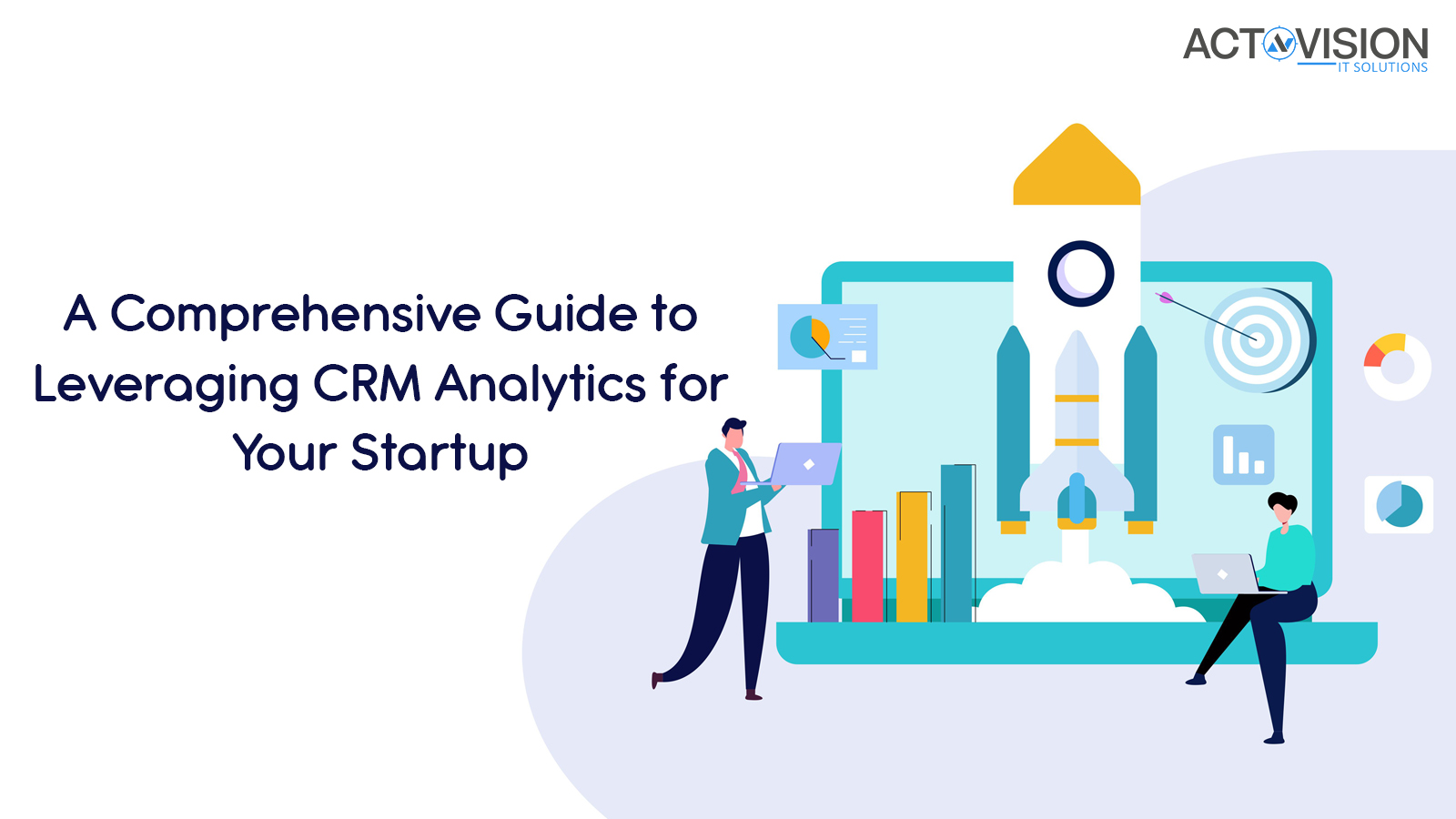As a startup owner, you’re always looking for ways to grow your business. One of the best ways to do this is by leveraging customer relationship management (CRM) analytics. CRM analytics is a powerful tool that can help you gain valuable insights into your customers’ behavior, preferences, and needs. By understanding your customers better, you can improve their experience and increase your sales. In this comprehensive guide, we’ll explore the benefits of CRM analytics for startups and provide you with tips on how to leverage this tool to drive business growth.
What is CRM Analytics?
Customer Relationship Management (CRM) Analytics is the process of using data analysis to understand customers’ behavior and needs. It involves using various metrics and techniques to analyze the data gathered through the CRM system. The objective of CRM Analytics is to gain insights into customers’ behavior and preferences, improve customer engagement, and ultimately increase business growth.
CRM Analytics is essential for startups as it helps them make data-driven decisions. It enables startups to identify potential customers, understand their needs, and tailor their products or services to meet those needs. It also allows startups to analyze customer behavior and identify trends that can help them create targeted marketing campaigns.
Startups can use CRM Analytics in several ways, including analyzing customer interactions, monitoring customer feedback, and tracking sales and marketing campaigns. With the right analytics tools, startups can access a wealth of data that can help them make informed decisions about their business strategies.
Overall, CRM Analytics is a valuable tool for startups looking to grow their business. By understanding their customers’ behavior and preferences, startups can create better products and services and improve customer engagement, which ultimately leads to increased revenue and business growth.
Why is it Important for Startups?
Startups operate in an incredibly competitive and volatile market. As a result, they need to be agile and adaptable in order to succeed. This is where CRM analytics can prove to be a game-changer. It enables startups to better understand their customers, track their behavior, and tailor their marketing efforts accordingly.
The customer is at the center of any business, and startups are no exception. Startups need to understand what their customers want, what they need, and what motivates them to make a purchase. This is where CRM analytics comes into play. By analyzing customer data, startups can gain valuable insights into their customers’ behavior, preferences, and pain points. They can then use this information to optimize their products, marketing campaigns, and customer experience.
Furthermore, startups often operate with limited resources. CRM analytics provides them with a cost-effective way to optimize their marketing efforts and target their ideal customers. By using CRM analytics, startups can track their marketing campaigns in real-time, measure their ROI, and adjust their strategies accordingly. This helps startups to maximize their limited resources and get the most bang for their buck.
Finally, startups are constantly evolving and growing. As they scale, they need to ensure that they maintain a strong connection with their customers. CRM analytics provides them with the tools they need to do just that. By tracking customer behavior, startups can identify trends and patterns that may be missed otherwise. This enables them to identify new opportunities for growth and innovation, while also strengthening their existing customer relationships.
In summary, CRM analytics is a critical tool for startups looking to grow their business and stay ahead of the competition. By leveraging customer data, startups can gain valuable insights into their customers’ behavior, optimize their marketing efforts, and identify new opportunities for growth.
How to Use CRM Analytics?
Using CRM analytics involves several steps that are aimed at gaining valuable insights from the data collected in your CRM system. Here are the steps you need to take:
1. Define your business goals: You should have a clear idea of what you want to achieve from your CRM analytics efforts. This will help you focus on the right metrics and data points.
2. Collect relevant data: The next step is to ensure that you are collecting all the relevant data that can help you achieve your business goals. This includes data on customer behavior, purchase history, demographics, and other factors.
3. Organize and store data: Once you have collected the data, you need to organize and store it in a way that is easily accessible and understandable.
4. Analyze data: With the data organized and stored, you can begin to analyze it using different tools and techniques to uncover patterns, trends, and insights that can inform your business decisions.
5. Visualize data: One of the most effective ways to communicate the insights you have gained from your CRM analytics is through data visualization. This can help you and your team easily understand complex data sets and make informed decisions.
6. Act on insights: Finally, it’s essential to act on the insights gained from your CRM analytics efforts. Use the insights to optimize your marketing strategies, improve customer service, and increase customer engagement and loyalty.
Benefits of Using CRM Analytics
As a startup, utilizing CRM analytics can bring a variety of benefits that will help you achieve business growth. Here are some of the benefits of using CRM analytics for your startup:
1. Improved Customer Segmentation:
With CRM analytics, you can analyze your customer data and segment your customers based on their demographics, behavior, and preferences. This allows you to tailor your marketing efforts and product offerings to specific groups of customers, improving your chances of driving sales.
2. Enhanced Customer Retention:
CRM analytics can help you understand the customer journey, including touchpoints and pain points. By analyzing this information, you can identify potential areas for improvement and implement strategies to improve customer retention.
3. Accurate Sales Forecasting:
With CRM analytics, you can forecast sales based on historical data and customer behavior. This allows you to predict future revenue, plan for growth, and make informed decisions about marketing and sales strategies.
4. Improved Customer Service:
By analyzing customer feedback and support data, you can identify areas where your customer service team can improve. This can help you create a more positive customer experience and increase customer satisfaction.
5. Cost Savings:
Using CRM analytics can help you optimize your marketing efforts, reducing wasted spend on ineffective campaigns. It can also help you identify areas where you can streamline your processes, reducing costs and improving efficiency.
Overall, leveraging CRM analytics is an essential step for startups looking to grow and succeed in their industry. By analyzing customer data, understanding customer behavior, and optimizing your sales and marketing efforts, you can drive business growth and achieve your goals.
Tips for Getting the Most Out of CRM Analytics
1. Set specific goals: Before diving into CRM analytics, it’s essential to define clear and measurable goals for your startup. For instance, you might want to increase customer acquisition, reduce churn rate, or boost customer retention. Once you’ve identified your objectives, use CRM analytics to track your progress and adjust your strategies accordingly.
2. Focus on relevant data: With so much data available, it’s easy to get lost in irrelevant details. Instead, focus on data that can drive actionable insights. For instance, you might want to track customer behavior, demographics, sales patterns, or social media engagement. By focusing on relevant data, you can uncover valuable insights and make informed decisions.
3. Invest in data quality: The quality of your CRM data is crucial for accurate analytics. Ensure that your data is clean, accurate, and up-to-date by using data validation tools, regular data hygiene checks, and automation processes. When your data is reliable, you can trust your analytics and make better decisions.
4. Use visualization tools: Visualizations can help you make sense of complex data sets and identify patterns. Use graphs, charts, and heat maps to highlight trends, anomalies, and opportunities. Visualization tools like Tableau, Power BI, or Domo can help you create dynamic and interactive reports that can be easily shared with your team.
5. Embrace automation: Automating routine tasks can free up your time and allow you to focus on strategic tasks. Use CRM automation tools to automate data entry, lead nurturing, email campaigns, or customer feedback. Automation can also help you streamline your workflow, reduce errors, and increase efficiency.
6. Continuously monitor and optimize: CRM analytics is not a one-time event, but an ongoing process. Continuously monitor your data and metrics to track progress and identify new opportunities. Regularly review your strategies, tactics, and campaigns to optimize your performance. Use A/B testing, segmentation, or personalization to fine-tune your approach and maximize your results.
By following these tips, startups can leverage CRM analytics to drive business growth and gain a competitive advantage. With accurate data, relevant insights, and continuous optimization, you can enhance customer experience, increase sales, and build lasting relationships with your audience.
Conclusion
Starting a new business is always exciting, but it comes with many challenges and responsibilities. One of the main challenges for any startup is managing their customer relationships effectively. This is where Actovision CRM Solutions can be of great help.
Actovision CRM Solutions is a comprehensive customer relationship management tool that is designed to help businesses of all sizes to grow by effectively managing their interactions with customers. It provides an easy-to-use platform that allows startups to track customer interactions, identify potential sales leads, and manage customer relationships efficiently.
Here are some of the key features that Actovision CRM Solutions offers that can help your startup grow:
1. Lead management – Actovision CRM Solutions makes it easy to track and manage leads by providing tools that allow you to automate lead capture and scoring, so you can quickly identify and prioritize the most promising leads.
2. Sales management – Actovision CRM Solutions provides powerful sales management features, including automated pipeline management, forecasting, and deal tracking. With these tools, startups can streamline their sales processes and improve conversion rates.
3. Customer management – Actovision CRM Solutions provides a complete view of your customer’s history and preferences, making it easy to provide personalized and efficient customer support.
4. Collaboration – Actovision CRM Solutions provides collaborative tools that enable teams to work together efficiently, sharing information and working toward common goals.
In summary, Actovision CRM Solutions is an all-in-one tool that can help startups manage their customer relationships more effectively. With its easy-to-use platform, powerful features, and affordable pricing, it is a great option for startups that want to grow and succeed.






